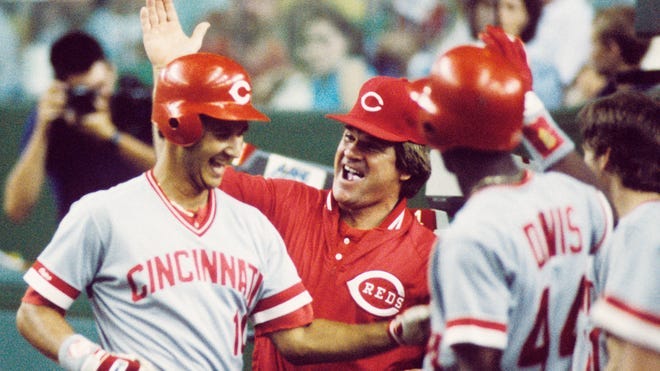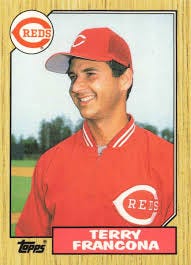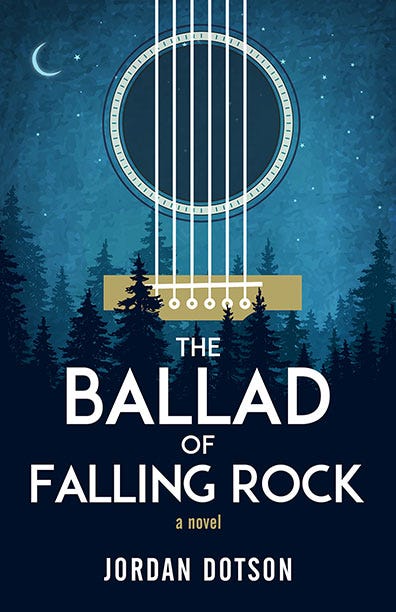Can the Reds Turn a Bold Hire into a Winning Era?
Sparky Anderson ain't walking through that door, but Terry Francona may be the next best thing
In my off-season preview over at The Magazine, I asked whether this off-season would be any different for the Redlegs:
Soul-searching and adjustments aside, it’s pretty clear to everyone on the planet what the Reds need to do to improve on this season’s disappointments. First, they need to hire a manager to replace David Bell, preferably one who will focus on fine-tuning Cincinnati’s horrific defense and baserunning. After hiring a new field general, they may want to, I dunno, add some good players? Seems radical, I know.
If the first step to improving the team was to hire an effective manager…well, we’re off to a great start.
After a year-long hiatus due to health issues, Terry Francona is poised to step back into a dugout—this time for our beloved Cincinnati Reds. I almost can’t believe I’m typing those words. His appointment signals a fresh chapter not only for Francona but also for a Reds franchise that hasn’t seen playoff success in three decades. It’s a hire that has generated considerable, and deserved, excitement. The big question, however, remains the same as it was when the 2024 campaign ended: whether the Reds’ front office can match that excitement with tangible roster and financial support to turn an exciting young team into actual playoff contenders.
Francona's career is a tale of redemption and adaptation. After a ten year playing career—including one season (1987) in Cincinnati, where he hit .227/.266/.295—he began his managerial journey with a rough four-year stint in Philadelphia, leading to his dismissal in 2000. Just a few years later, he would become the face of one of baseball’s most remarkable transformations: leading the Boston Red Sox to their first World Series title in 86 years. That 2004 championship erased a decades-long curse and cemented Francona’s legacy. A second title with Boston followed in 2007, and a decade of consistency in Cleveland demonstrated his ability to do more with less. In Cleveland, he orchestrated multiple playoff runs, including a near-miss in the 2016 World Series, all with limited financial resources. Francona now sits 13th on the all-time managerial wins list, with 1950 victories—a total destined to increase as he helms the Reds.
Let’s be clear, Francona's hire is a statement move by the Reds, eager to shake off the dust of a disappointing 77-85 season. It's also a gamble—one that challenges the Reds’ leadership to put substance behind the decision. I really want to believe—desperately!— that hiring a manager with Francona’s pedigree isn’t just about name recognition; it's about committing to a culture of winning. But, you know, the last three decades causes me to have more than a few doubts. Fool me once, etc.
Look, I’m not looking for the Reds to compete financially with the Yankees or Dodgers. But among most fans, there seems to be an expectation that hiring a two-time World Series champion means committing to a roster that can compete for a playoff berth. Otherwise, this hire risks becoming an empty gesture—an appeal to nostalgia with no foundation. Fan service. Look, we’re trying!
This isn’t uncharted territory in baseball. Just look at the Texas Rangers, who hired Bruce Bochy out of retirement two years ago. They went from irrelevance to World Series champions. Francona’s signing appears to align more with the Bochy strategy, an experienced hand guiding a team with a blend of youth and potential.
“This is an extremely talented young team,” Francona said at his introductory press conference. The Reds have talent on the 40-man roster. But David Bell’s managerial tenure shows the difficulty in transforming that raw potential into a championship-caliber team. That transformation also requires strategic investment. Nick Krall and Brad Meador and the rest of the management team faces a critical crossroads: Will they trade away any prospects to acquire immediate help? Will they spend to backfill weaknesses in the rotation and address glaring defensive gaps? Will they add a crucial bat or two to a lineup that struggled to score last season?
Reds fans are rightfully skeptical. We keep being told that “Cincinnati is a small-market team,” and what ownership claims is financial prudence often translates into an unwillingness to spend. As Francona noted, payroll discussions never came up during his recruitment—and that’s a somewhat worrying admission for those fans hoping for a major roster overhaul. CEO Phil Castellini’s more recent public comments, though not as bad as what we’ve heard from him over the years, have been less than reassuring. He promised that all available resources go directly to the field. Sure, Phil. We remember your slide deck explaining why the Reds could never compete. Believe him at your peril, but even if that were true, it sidesteps the real concern: whether the resources the ownership group allows to be spent on players will be enough to make a difference in the hyper-competitive National League Central.
Meanwhile, the Reds face uncertainty on another financial front: broadcast revenue. Bally Sports, their TV partner, is embroiled in bankruptcy negotiations, and a potential revenue hit could provide an easy excuse for ownership to further constrain Cincinnati’s budget. A reduction in broadcast income would certainly impact the team’s financial flexibility. The Reds need a strategy to navigate this uncertainty without it becoming an excuse for stagnation.
Presumably, at least some of the strategy behind hiring Francona is that he is no stranger to operating within constraints. In Cleveland, he squeezed value out of a limited payroll, creating a contender year after year, thriving in an environment where he was required to maximize talent, regardless of financial limitations. His experience in managing both big-market expectations in Boston and budget-conscious decisions in Cleveland gives him a fascinating resume. However, even the best managers need some leeway to succeed. “As long as people communicate with me and I understand the expectation—my job’s to get the most out of players,” Francona said, underscoring the importance of alignment between the front office and the dugout.
The Reds have already demonstrated something of a commitment by landing a high-profile manager. The next steps will involve shrewd roster decisions and a willingness to spend when necessary. It won’t take a Yankees-sized budget to compete, but it will take creativity and, most importantly, a genuine desire to win. It’s clear that this franchise hasn’t had that genuine desire to win in many years. Francona’s hire is a positive step, but the Reds' front office must now turn symbolic optimism into a substantive plan.
Because Francona's presence alone won’t make the Redlegs a contender. His health may have improved, and his fire to compete has returned, but Francona needs more than young prospects and budget buys to build a winning team. Nick Krall and company can't rely solely on Francona’s magic touch; they must invest in the roster and back him with the resources required to compete. It’s not even necessarily about throwing money at the problem—it's about smart investments that align with Francona’s strengths.
Hiring Terry Francona to manage the 2025 Cincinnati Reds was an excellent decision. Firing hitting coaches and hiring a new one — I dunno, it’s probably a good development. In my opinion, the easy part is now out of the way. So what’s next?
A Book Update!
The updated manuscript for the second edition of “The Big 50: The Men and Moments That Made the Cincinnati Reds” is off to the publisher. We have a bunch of new chapters, and a new foreword from the crafty lefthander, Chris Welsh. It’ll be in bookstores this spring! Chris and I can’t wait for you to read it.
Another book update!
“The Ballad of Falling Rock,” the debut novel from Jordan Dotson — who happens to be one of my younger brothers — is in bookstores now. It’s a work of southern fiction, and you’re going to love it, I promise. Here’s the premise:
Truth told, folks still ask if Saul Crabtree sold his soul for the perfect hymn. If he sold it to angels or devils. A Bristol newspaper once asked: “are his love songs closer to heaven than dying?” Others wonder how he wrote a song so sad, everyone who heard it died of a broken heart.
Yet, more than anything else folks ponder in the town of Trinity, one question lingers: why did this angel-toned preacher’s son, just as his fame seemed ready to light the Appalachian nightsky forever, disappear completely?
In 1938, the decisions Saul makes will alter his family’s story for generations. He and his eerily talented descendants ignite religious fear throughout Red Pine County. They navigate chapels, decaying sanatoriums, high school hallways, and a lingering myth from their Cherokee heritage that follows them wherever they go.
In the end, however, it’s Saul’s precocious grandson, Eli, who must find answers to these heartbreaking questions, who must enter this world rich in music and voices, where people die to hear the unspoken, and salvation is only found in the not-yet sung.
I just adore the story. If you’re interested, it’s available online in hardback, paperback, and e-book editions.
Welcome, new readers!
We’ve had a flurry of new subscriptions in recent weeks. The full archives are available here. Since my primary interest is the history of baseball’s oldest professional club, there’s always something to read that isn’t past its sell-by date. Below are some recommendations for those dark winter nights in which you’re missing the ol’ Redlegs.
Babe Ruth, home runs, and murder
On Fathers and Sons and Baseball
Building the Essential Cincinnati Reds Library
The most underrated Reds team of all time
When the Reds acquired a baseball legend for $100...and then simply gave him away
The joy of baseball in the background
The 86 Best Baseball Movies of All Time
Joe Nuxhall, audio cassettes, and memories
Mario Soto: Unlucky and Underrated
The Wildest and Wackiest Off-Season in Reds History
Why I love Opening Day in Cincinnati
In Appreciation of the 1999 Reds
Thanks for joining us on this ride, and welcome! Please feel free to share this newsletter with all your Cincinnati sports-loving friends and family.







I saw the “we haven’t discussed payroll” statement in real time. I was home that morning. Whoever asked that question asked a good one, though the answer was disappointing to me. We fans know what we were hoping to hear. We can’t really make any assumptions, and like you, I am remaining very cautious, with hopes kept on a short leash. Call us realists.
As for your brother’s book, it looks compelling. The excerpt has a nice flow.